Get Shorty Blu-ray Movie
HomeGet Shorty Blu-ray Movie 
Metro-Goldwyn-Mayer | 1995 | 105 min | Rated R | May 29, 2011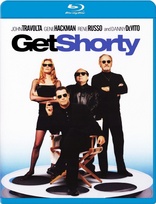
Movie rating
7.2 | / 10 |
Blu-ray rating
| Users | 4.0 | |
| Reviewer | 4.0 | |
| Overall | 4.0 |
Overview
Get Shorty (1995)
A mobster travels to Hollywood to collect a debt and discovers that the movie business is much the same as his current job.
Starring: John Travolta, Gene Hackman, Rene Russo, Danny DeVito, Dennis FarinaDirector: Barry Sonnenfeld
| Crime | Uncertain |
| Comedy | Uncertain |
Specifications
Video
Video codec: MPEG-4 AVC
Video resolution: 1080p
Aspect ratio: 1.85:1
Original aspect ratio: 1.85:1
Audio
English: DTS-HD Master Audio 5.1 (48kHz, 24-bit)
Spanish: Dolby Digital 2.0
French: DTS 5.1 (48kHz, 24-bit)
Portuguese: Dolby Digital 2.0
Italian: DTS 5.1
German: DTS 5.1
Spanish: DTS 5.1 (48kHz, 24-bit)
Japanese: DTS 5.1
DD 2.0 256 kbps, DTS 5.1 24-bit
Subtitles
English SDH, French, German SDH, Italian, Japanese, Portuguese, Spanish, Danish, Dutch, Finnish, Korean, Mandarin (Simplified), Norwegian, Polish, Swedish
Discs
50GB Blu-ray Disc
Single disc (1 BD)
Playback
Region free
Review
Rating summary
| Movie | 4.5 | |
| Video | 4.0 | |
| Audio | 3.5 | |
| Extras | 4.0 | |
| Overall | 4.0 |
Get Shorty Blu-ray Movie Review
He's the one telling you how it is.
Reviewed by Michael Reuben June 2, 2011Elmore Leonard's novels don't make good movies, but Get Shorty is an exception. Maybe it's because Get Shorty was the book in which Leonard satirized Hollywood, and Tinseltown has always enjoyed poking fun at itself. It probably didn't hurt that the film was made by people who, at least at the time, were trying to keep their distance from the industry's hub. The production company was Danny DeVito's East Coast-based Jersey Films, known for unconventional fare like Pulp Fiction. The screenwriter was Scott Frank, who was so disenchanted with the movie business that he wanted to quit and had to be strong-armed into taking the assignment. (Frank would go on to write Out of Sight, co-write Minority Report, and write and direct The Lookout.) And the director was Barry Sonnenfeld, who'd started his career as a D.P. for the Coen Bros. and hadn't yet hit the stratosphere with Men in Black. No one cared who they offended, which was probably why they had so much trouble finding a studio to fund and release the film. MGM took the chance and reaped the rewards.
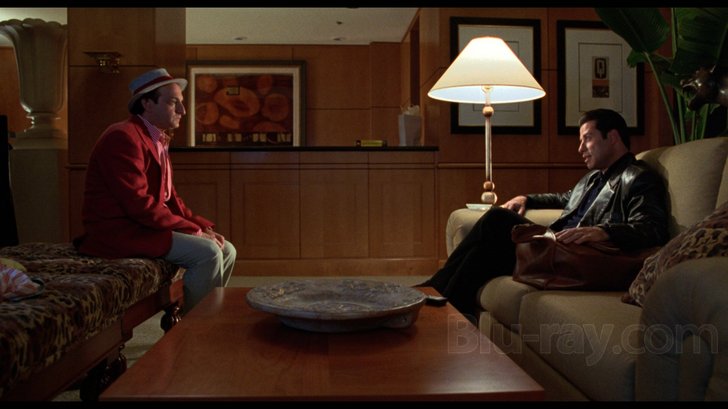
Chili Palmer confronts Leo.
Get Shorty is nominally the story of Chili Palmer (John Travolta), a small-time Miami loan shark who relocates to Los Angeles and decides to join the movie business. I say "nominally", because Chili encounters a lot of people in the process of reinventing himself, and their stories are as interesting as his. A big reason why Get Shorty is so entertaining is that both Chili and the audience keep getting pulled from one subplot to another, sometimes several at a time, and you really don't know until the end how it's all going to work out.
Despite being a crook, Chili is the honorable man in a world of cheats, liars and bullies. He's also passionate about movies, both the famous and the obscure. When he finds himself at odds with a local hood named Ray "Bones" Barboni (played by Dennis Farina with a zesty lack of couth and a wardrobe that screams Miami Beach), Chili leaves town ostensibly to collect on a debt in his "book". But after tracking the errant client, a dry cleaner named Leo Devoe (David Paymer), to a Vegas casino, Chili finds that Leo has moved on to L.A. and picks up an additional assignment. As long as he's heading west, can he help the casino collect on a marker from a film producer named Harry Zimm (Gene Hackman)?
Chili goes to see Zimm, but he's much more interested in pitching him an idea for a movie, especially since Zimm is bedding down with Karen Flores (Rene Russo), a B-movie actress Chili admires. (She's shocked - and flattered - to meet someone who actually knows her work.) Zimm wants Karen to use her influence to sign her ex-husband, a major star named Martin Weir (Danny DeVito), to Zimm's latest project, Mr. Lovejoy. "This", he tells Chili, "will be my Driving Miss Daisy", by which he means his ticket out of schlock. One problem though: Zimm doesn't have the $500,000 he needs to buy the script rights from the author's widow (Bette Midler). Hence the unsuccessful trip to Vegas.
Complicated enough? But wait, there's more! The stake that Harry gambled away in Vegas belonged to a couple of coke dealers who operate a limo service as a front. Bo (Delroy Lindo) and Ronnie (Jon Gries) see themselves branching out, because, as Bo says, what's the point of living in L.A. if you're not in movies? Bo and Ronnie gave Zimm $200,000 for one of his monster movies, but then he promptly disappeared, along with the money. They're nervous and impatient. They're also having problems with their foreign supplier, because the DEA is monitoring the airport, where they usually make their exchanges. Shortly, a gentleman named Mr. Escobar (Miguel Sandoval) arrives demanding satisfaction on several outstanding matters. And with a name like "Escobar", he has to be taken seriously.
There are still more interesting characters I haven't mentioned, including Bear, the ex-Hollywood stuntman who's Bo's "muscle" and is played by a pre-Sopranos James Gandolfini, barely recognizable with a ponytail and a South Carolina accent. It's a tribute to the fluid grace with which the film has been written, performed, shot and edited that all these vivid personalities remain distinct and in balance as Chili Palmer weaves his path among them - in a tidy running time of just 105 minutes (the "65 Mins" on the back cover of the Blu-ray case is a misprint).
The dialogue is critical. Screenwriter Frank was smart enough to borrow large chunks of Leonard's original dialogue without alteration, and director Sonnenfeld insisted that the actors speak it word for word, without deviating from the script. He also kept them talking fast, so that the pace never slackens, and his experience as a cinematographer helped him design shots that convey essential story information quickly and efficiently. When acts of violence occur, they're almost always a shock, because everything moves so fast that they seem to come from nowhere. (One scene so upset test audiences that Sonnenfeld was urged to cut it; he refused, because he wanted to keep viewers alert.)
The film is very funny, but the humor arises from character, not gags. Even the most ridiculous situations are played with a straight face. It doesn't get much better than the scene in which Chili and Bo sit in Zimm's office discussing how to fix the script of Mr. Lovejoy. Neither of them has ever written a script, and one of them hasn't even read the one they want to rewrite, but they're both supremely confident that they know what they're doing - a loan shark and a coke dealer as budding studio executives.
The glue that holds it all together is Travolta's Chili Palmer, which, with all due respect to fans of Pulp Fiction and Saturday Night Fever, is my favorite among Travolta's roles. Like many great performances, it almost didn't happen. Sonnenfeld wanted DeVito for the role, but DeVito had scheduling conflicts and took the smaller part of Martin Weir. Travolta passed on the part and had to be talked into it by Quentin Tarantino. Unlike Ray Bones, Chili dresses simply and elegantly, and he never sweats the details, unless it involves a movie. (The dispute with Bones in Miami begins over a leather coat, "just like the one Pacino wore in Serpico".) Chili is, always and everywhere, the smartest, calmest and most honest man in the room. In a town like L.A., those qualities, backed by a dangerous reputation, give him a huge advantage.
Get Shorty Blu-ray Movie, Video Quality 
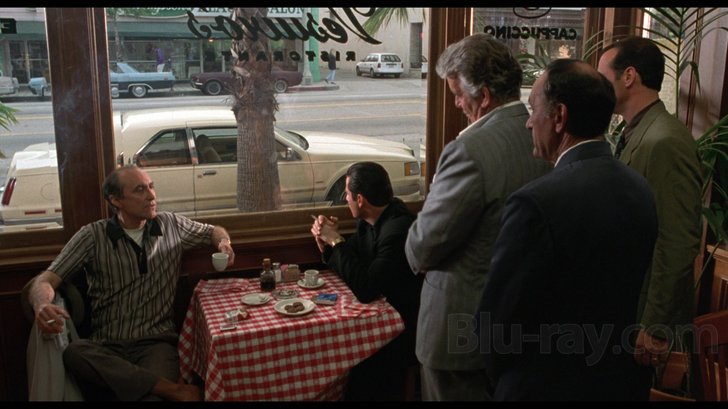
Get Shorty was shot by Don Peterman, who passed away earlier this year after a long and distinguished career that included such varied fare as Flashdance, the second Addams Family film, Star Trek IV: The Voyage Home, Point Break and Men in Black. Peterman's films with Sonnenfeld were typically distinguished by a clean, low-grain elegance, with precise lighting and solid blacks, and the Blu-ray has accurately reproduced this look for Get Shorty. The Blu-ray captures the just-too-bright, slightly artificial look of the L.A. and Florida locales (the latter also shot in L.A.) where most of the action occurs. Detail is excellent, allowing the viewer to take in the full extent of settings like the ancient bric-a-brac in Harry Zimm's office or the fussy decor in Bo's Laurel Canyon house. An encounter between Chili and Bear shot in silhouette in a parking garage showcases varying shades of black and gray, and the hothouse pastels of Ray Bones's wardrobe are delineated with precision. Touches of grain can be observed, but the cleanliness of the image is inherent to the source. I did not detect any artifacts caused by filtering or other forms of noise reduction.
Get Shorty Blu-ray Movie, Audio Quality 
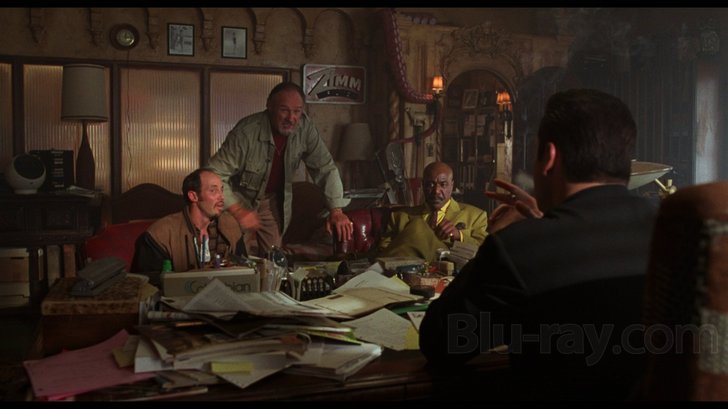
Get Shorty is such a talky film that Sonnenfeld was convinced he had a flop on his hands, until he heard audiences laughing. Because the film depends on character and dialogue, it doesn't offer many opportunities for sound designers to show off. The DTS lossless soundtrack contains appropriate ambient sounds for environments such as restaurants, parking garages or airports, but nothing that will make your head turn or duck. The occasional punches or gunshots have impact, but their effect is achieved more by contrast with the spoken word than by volume. Where the track excels is in reproducing the film's memorable soundtrack by John Lurie, with contributions from Billy Martin and a number of selections from Booker T. and the MG's. It's a cool, jazzy soundtrack that perfectly accompanies the cool, self-assured improviser who entered Hollywood as a loan shark and stayed as . . . well, you'll see.
Get Shorty Blu-ray Movie, Special Features and Extras 
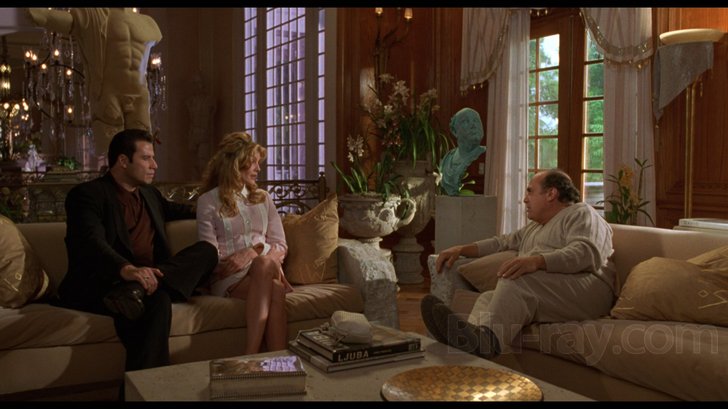
As with other recent MGM discs, e.g., The Cutting
Edge, Fox has mastered this title with no
main menu. The disc goes directly from loading to playback. During playback, the pop-up menu
contains an option for "pause" but none for "menu", and any attempt to access a "top menu"
produces an error message. After the film finishes, it simply starts again from the beginning. This
arrangement is a huge inconvenience for playing extras.
Despite the "bare bones" menu structure, Fox has nevertheless mastered the disc with BD-Java,
which wouldn't matter so much except that the ability to set bookmarks has been omitted. No
BDJ-encoded disc should ever lack this capability. BDJ prevents the user from stopping
playback and starting from the same position, and bookmarking is the only workaround. Its
omission is inexcusable.
- Commentary with Director Barry Sonnenfeld: Sonnenfeld recorded this commentary for DVD while he was prepping Men in Black. With blockbuster success still to come, he wasn't yet giving free reign to the eccentricities that have since intruded into most of his interviews, and the commentary is a low-key and entertaining account that focuses primarily on shooting the movie. Sonnenfeld identifies various locations, describes shooting techniques, notes which scenes were shortened from the original script, discusses contributions of various actors to their characters and points out ad libs. He also drops interesting tidbits about the development process, such as an early read-through, before casting had been completed, at which Gene Hackman and Dennis Farina stole the show.
- Get Shorty: Look at Me (SD; 1.33:1; 26:53:) This superior featurette was made in 2004 for the two-disc "collector's edition" DVD. It includes interviews with Leonard, Frank, Sonnenfeld, Travolta, DeVito and Hackman, among others, who discuss aspects of the film and the characters in depth.
- Get Shorty: Wiseguys and Dolls (SD; 1.33:1; 20:28): Also made in 2004, this featurette focuses on the film's female characters and the gangsters. The interview footage with Russo, Delroy Lindo and Dennis Farina is from 1995. In an additional section, Sonnenfeld discusses his transition from cinematographer to director.
- The Graveyard Scene (SD; 1.33:1; 4:19): Sonnenfeld discusses a major deleted scene in which Chili Palmer visits the set of a Harry Zimm film. Ben Stiller played the director and appears in interview footage from 1995.
- Deleted Graveyard Scene (SD; 1.85:1, non-enhanced; 3:32): The complete deleted scene, which is very funny.
- Going Again (SD; 1.33:1; 5:33): Long, largely unedited takes of DeVito in his first major scene with Travolta and Russo. As Sonnenfeld explains in an introduction, DeVito, who is also a director, understands that the moment you call "cut!", control of the set reverts to other departments (lighting, hair and makeup, etc.). So the two of them tacitly agreed to leave the camera running until the film ran out, and DeVito would just "go again" whenever he blew a line. This approach also helped him find the most effective reading. (Ben Stiller used a similar approach with improvisation on Tropic Thunder.)
- Get Shorty Party Reel (SD; 1.33:1; 5:48): More of a scrapbook than gag reel, much of this compilation appears to be sourced from videotape, and it is correspondingly murky. The best parts are from Travolta's love scenes with Russo, which, as Sonnenfeld describes on the commentary, he enjoyed so much that he prolonged them by doing takes in accents and foreign languages.
- Page to Screen of Get Shorty (SD; 1.33:1; 29:34): Once upon a time, the Bravo network produced shows you could take seriously. Page to Screen was one of them. This episode focused on Elmore Leonard's career, his troubled history with film adapations, and the process by which Get Shorty was adapted for the screen.
- Vignettes (SD; 1.33:1; 6:03): These are four short interview clips. In two of them, Sonnenfeld talks about the perils and privileges of being a director. In the other two, DeVito tells anecdotes about the struggle to get the movie made.
- Trailer (SD; 1.85:1, enhanced; 2:41): A great trailer that aptly captures the tone of the film while leaving plenty for the viewer to discover.
Get Shorty Blu-ray Movie, Overall Score and Recommendation 
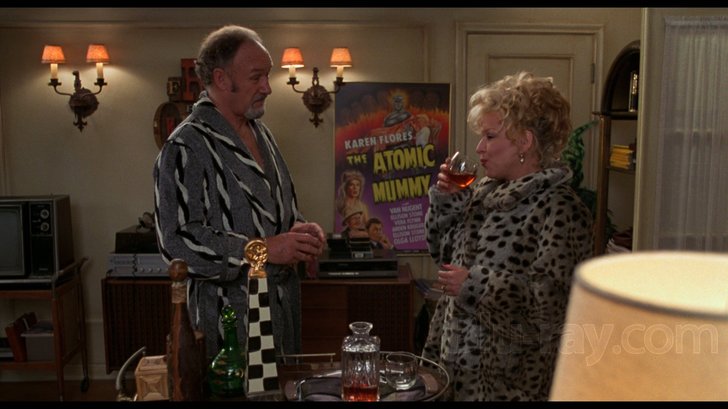
The 2005 "collector's edition" DVD contained a feature that will never again be included on any
edition of Get Shorty: a sneak peak at the misbegotten sequel,
Be Cool. Based on Leonard's
follow-up novel, starring Travolta and directed by F. Gary Gray, the film flopped and deservedly
so. Watching it made you realize just how big a magic trick the creators of Get Shorty pulled off.
Along with Jackie Browne, the film stands as the only effective adaptation of an Elmore Leonard
novel, and one of the great comedies about the movie industry. The Blu-ray presentation is solid
and recommended.
Other editions
Get Shorty: Other Editions

Get Shorty
MGM 90th Anniversary
1995

Get Shorty
1995

Get Shorty 20th Anniversary Edition
Bilingual
1995

Get Shorty
1995

Get Shorty 20th Anniversary Edition
Limited Edition Collectible Cover Art | Bilingual
1995

Get Shorty 20th Anniversary Edition
Limited Edition Collectible Cover Art | Bilingual
1995

Get Shorty
1995
Similar titles
Similar titles you might also like

Find Me Guilty
2006

Mobsters
1991

Jimmy Hollywood
1994

Harlem Nights
1989

Swingers
1996

The House
2017

Moonwalkers
2015

Analyze This
1999

Any Which Way You Can
1980

The Paper
1994

Fled
1996

The A-Team: The Complete Series
1983-1987

White Men Can't Jump
1992

My Blue Heaven
Warner Archive Collection
1990

Top Five
2014

Let's Be Cops
2014

Shade
MVD Marquee Collection
2003

Throw Momma from the Train
1987

Entourage: The Movie
2015

Balls of Fury
2007